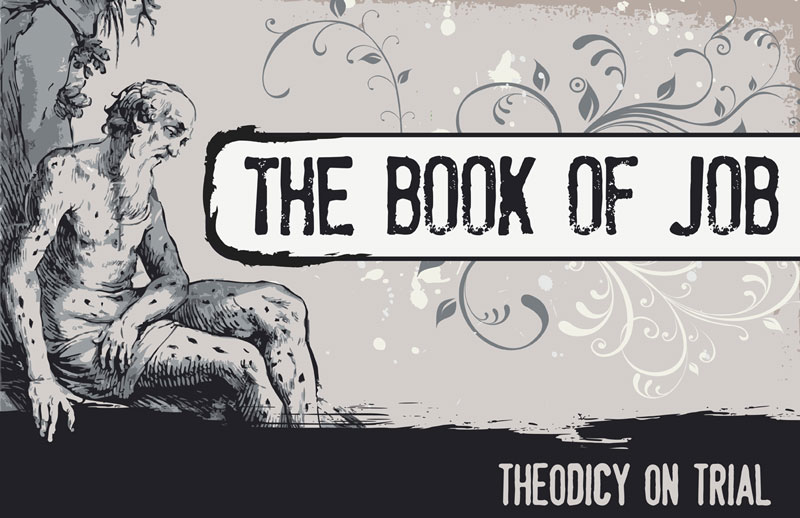[First published in 2014. The translation used here is a composite of various translations, though the main text is from The Complete Tanach by Rabbi A.J. Rosenberg, courtesy of Chabad.org. For the Book of Iyov/Job specifically, we choose to use “sons of God” instead of ‘”angels” or the Hebrew ‘malakim’, and ‘the adversary’ interchangeable with the Hebrew ‘ha satan’ for reasons that will become clear as you read. And of course, we choose to proclaim the Tetragrammaton Name, YHWH instead of using LORD or HASHEM.–Admin1.]

Image from www.redbubble.com
The book of Job is considered a literary masterpiece such that it is included among the MUST READ list of literature majors; something to marvel at because this ancient piece of writing is determined to be the earliest among the manuscripts of the Hebrew Scriptures. That should put us ‘moderns’ to shame if we can’t produce writing of this calibre in terms of poetry, plot, character development, wisdom, and more — it almost appears like God Himself penned the original manuscript.
As it is with translations, no doubt the English pales in comparison with the original Hebrew but literary merit aside, what is more significant is the insight we gain about God and man, and the problem of suffering in a way no other book confronts it. But we will reserve the in-depth and full discussion of Job for a future article.
For this article’s specific topic, confine the discussion of Job only to it’s being listed as prooftext for the existence of the devil. It is our objective to check out claims and teachings if only to get the facts right, straighten out wrong thinking based on wrong interpretation of prooftexts which useTNK verses for justification. It is one thing for a religion to write its Scriptures obsessing with the devil from the gospels to Revelation; it is another thing to use the sacred scriptures of a distinct people and use it as proof for doctrinal beliefs.
In the case of fallen angels and the occult, as we have already explained in previous articles, it is outright propagation of myth, legend, superstition, untruths that run counter to the foundational teachings in TNK.
So on to Job.
Who is this character referred to as “the adversary,” ha satan in Hebrew? He not only appears as a prominent figure but also plays an adversarial key role against the narrative’s protagonist Job. If there is proof of a devil, this appears to be it!
Unlike “the serpent” in Genesis 3, ha satan in the context of Job is one of God’s creatures who has access to His realm, with whom He converses and interacts. John J. Collins, Introduction to the Hebrew Bible cites texts in various TNK books where ha satan appears and clarifies this character’s role:
In none of these cases [Zechariah 3, 1 Chron. 21:1] is Satan the demonic figure or devil of later mythology (he has that character in texts from around the turn of the era, including the New Testament). Here he appears to be a member of the heavenly council, in good standing. At least he has the right of access at meetings of “the sons of God” or lesser divinities (who are demoted to the rank of angels in later Judaism and Christianity). His job, however, is distinctive. He is a roving prosecuting attorney, who goes to and fro upon the earth to ferret out wrongdoing and put humanity to the test.
After a brief introduction on the character of Job, the narrative transports readers to YHWH’s heavenly court:
1:6 Now the day came about, and the sons of God came to stand beside YHWH, and ha satan [the adversary], too, came among them.
Imagine, ha satan, the adversary is counted among the “sons of God” and given special mention. If we think God cannot stand to even look at the Devil or would not allow this rebel to be in His Presence, shouldn’t we expect God to say:
“Get out of my sight you evil fallen rebellious creature, you have no business being here with the other angels who have obeyed me 100%! You belong in hell, but go back to earth where I hurled you down and wait out your time there! Besides, you”ve got a future assignment to tempt Me when I metamorphose into the Trinity, and deal with Me as My alter ego, My Son.”
Ridiculous? Absolutely, because instead He says—
7. YHWH said to the adversary, “Where are you coming from?” And the adversary answered YHWH and said, “From going to and fro on the earth and from walking in it.”
Notice that God is surrounded by his heavenly court of messengers (for that is all ‘angels’ are, part of the ‘heavenly hosts’, messengers of God who do his bidding and sent on errands), yet He interacts with only one — the handpicked “son of God” to do the special task of testing humankind, the one who makes man aware he has free will to choose between two alternatives: walk God’s Way, or walk his way. The same one who in this book will obediently carry out a strange divine assignment, the oppression of a so-far untested “righteous” man. Now, is that the image portrayed in the Christian scriptures of Satan, Lucifer, the Serpent of Old, the Dragon of Revelation 12, etc.?
So the exchange between Creator and messenger continues:
8. Now YHWH said to the adversary, “Have you paid attention to My servant Job? For there is none like him on earth, a sincere and upright man, God-fearing and shunning evil.”
9. And the adversary answered YHWH and said, “Does Job fear God for nothing?
10. Haven’t You made a hedge around him, his household, and all that he has on all sides? You have blessed the work of his hands, and his livestock has spread out in the land.
11. But now, stretch forth Your hand and touch all that he has, will he not blaspheme You to Your face?”
12. Now YHWH said to the adversary, “Behold, all that he has is in your hands; only upon him do not stretch forth your hand.” Now the adversary left the presence of YHWH.
What are we to make of this? YHWH allows one of His angelic creations– the adversary — to challenge His perfect knowledge about the righteous life of Job and his heartfelt worship and devotion to God. This is only the first round of similar exchanges between God and ha satan about the increasing pressure to be applied to Job; in fact these exchanges show up like a familiar refrain throughout the book. With each testing, we learn more about the extent of Job’s patience in suffering and his continuing faith in his God.
1. Now the day came about that the angels of God came to stand beside YHWH, and the adversary too came among them to stand beside YHWH.
2. Now YHWH said to the adversary, “Where are you coming from?” And the adversary replied to YHWH and said, “From going to and fro on the earth and from walking in it.”
3. And YHWH said to the adversary, “Have you paid attention to My servant Job? For there is none like him in the earth, a sincere and upright man, God-fearing and shunning evil, and he still maintains his sincerity. Yet you enticed Me against him.”
What? This ha satan is able to persuade God Himself? Does that sound like the Christian Devil who tempts Jesus (mouthing OT scriptures at that) in the wilderness, but Jesus resists his every suggestion?
4. Now the adversary replied to YHWH and said, “Skin for skin, and whatever a person has he will give for his life.
5. But, stretch forth Your hand now and touch his bones and his flesh, will he not blaspheme You to Your face?”
6. And YHWH said to the adversary, “Here he is in your hands, but preserve his life.”
Notice that while God gives ha satan permission to afflict Job, he places a limitation on how far the adversary can go. The wonder of this exchange, in case you hadn’t noticed is —-ha satan obeys his Creator’s will, just like all angelic messengers given assignments affecting humankind; in fact ha satan does not overstep the set boundary. Now, does that sound like a rebellious fallen angel who will buck his BIG BOSS’s instruction?
9. Then his wife said to him, “Do you still maintain your sincerity? Blaspheme God and die!”
10. And he said to her, “You talk as one of the disgraceful women talks. Shall we also accept the good from YHWH, and not accept the evil?” Despite all this, Job did not sin with his lips.
Thanks to the continuing infliction of pain upon Job by ha satan on assignment from God, we continue to get a glimpse of Job’s strength of character and unswayed devotion to God; instead he curses the day he was born. If there’s a character who develops admirably and truly emerges as a “hero” here, it’s not God nor ha satan, but Job, the clueless victim of . . . well, two heavenly bullies, a nagging wife, and friends, supposedly sympathetic, yet who point their accusatory fingers at him.
The narrative moves on to the three friends of Job who give their two cents worth about why Job is suffering and of course all three are off. Readers are privy to why Job is suffering, knowing the conversation and ‘bet’ between God and ha satan. For now, we will leave it at that since we’re dealing only with ha satan here.
Conclusion:
- Does this book confirm that there is an adversary, a ha satan used by God for His purposes? Yes.
- Does it prove “Satan” the Christian Devil and his fallen angels exist? No.
It is our understanding that since this book has been relegated to the third division of the Hebrew Scriptures –the Ketuviim–-or “The Writings”—- it is to be considered as divinely inspired writing coming from the understanding of its author who is not named. Hence, one does not build a doctrine on it except where it affirms and conforms with the foundational teaching of the TORAH.
For interesting discussions on Job and the question of why man suffers, here are three books with differing perspectives and conclusions:
- Atheist turned Christian, C.S. Lewis, The Problem of Pain
- Christian turned atheist, Bart D. Ehrman, God’s Problem: How the Bible Fails to Answer our Most important Question —Why We suffer
- Consistently Jewish in Judaism, Rabbi Harold S. Kushner – The Book of Job: When Bad Things Happened to a Good Person (Jewish Encounters)
For additional commentary on the book of Job, please check out these posts:

Image from www.doxologia.ro –



Reader Comments